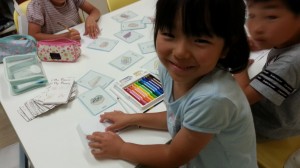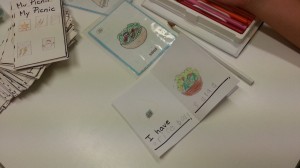Sometimes I am surprised that even with all the things we now know about how people really learn a foreign language, the old myths still persist. One myth that stubbornly refuses to go away is the “banking and ATM myth”. Believers of this myth think that when you learn new vocabulary or grammar, it is stored in your brain in the same way that you deposit money in a savings account. They further believe that once you have enough language in your “account”, in order to communicate, all you need to do is make a “withdraw”, in the same way that you would take out money using your cash card.
This idea is just as outdated as the “your brain is like a computer” neuromyth. Computers never forget information; your brain often does.
The best way to remember new vocabulary words or grammar when you are studying a foreign language is to start using them as soon as possible, instead of saving them for later. Even very young students are able to do this. First grade students at BIG BOW English Lab, soon after learning weather and food vocabulary, enjoy making books about going on a picnic and later presenting them to their classmates. They choose what they would like to take on the picnic and proudly share the books with their parents when they go home.







